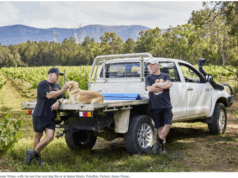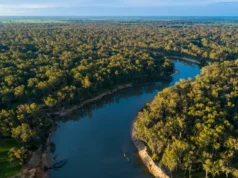
Photo credit: Ricky French
One of the most recognisable symbols of the global pandemic, billions of dollars’ worth of grounded passenger jets, bake under the desert sun at Alice Springs Airport, in a town that has barely seen a Covid-19 case.
Alice is an island within an island. As the country unravels around the edges this nucleus remains solid and so far impenetrable. It has to stay that way. An outbreak among the indigenous communities here doesn’t bear thinking about.
It’s a town free from Covid-related imposts, save for QR code check-ins. The only things masked are the dormant plane engines at the airport. Interrogations come not from contact tracers but security guards at liquor stores, who scrutinise buyers’ intentions and scan ID at the checkout. At Red Kangaroo Books a sign in the window says, “Keep your distance – at least 1 adult kangaroo apart,” but throughout town “social distancing” is just another big city buzz phrase.
And so life goes on. A family of five cross the road with their pushbikes, heading for the bike track out to the historic Telegraph Station. Tanned teenagers drift by on skateboards. Indigenous artists sit crossed legged on the grass in Todd Mall, selling paintings under the shade of towering ghost gums. Beside them is one of those novelty end-of-the-world direction signs pointing to ludicrous interplanetary outposts: Washington DC – 16697kms; Rio de Janeiro – 14,874kms. Australia’s east coast would seem almost as remote if it wasn’t so dangerously close.
The closest Alice wants to get to Melbourne is Page 27 café, with its eclectic decor of old typewriters, oil cans, projectors and a barber’s chair. It’s full on this Monday afternoon. Harried staff bounce around the cafe carrying trays of coffee in search of a table. The pandemic has meant there’s a massive shortage of workers in town, every business is seeking staff. “No experience necessary,” says the sign at Stumps café. At the Crowne Plaza guests are offered a $15 food and drink voucher for each day they choose not to have their room serviced.
Toyota Landcruisers loaded to the gunwales cruise the streets, as if assessing escape routes. Travellers discuss strategy to avoid the latest hotspots. Head west is the message today. But west is nothing but desert. You might be safe in Darwin for a while.
Distance offers some protection, but the town is not immune to conspiracy theories surrounding the vaccine. Only out here it wasn’t the Bill Gates microchip communities feared was going to be injected into them, but the devil.
Thankfully, that hesitancy was short-lived. Indigenous health workers from the town’s clinics marched into the communities to deliver an unequivocal message: Youse mob all gonna be sick if you don’t get your needle. Don’t be silly. People talking silly way to you about the devil going into you. This is to make you healthy and safe. You won’t be on this Earth anymore if you don’t get this needle.
And unlike the silly-talking white mobs of northern NSW, the mobs listened and rolled up their sleeves for the needle. The Northern Territory now leads Australia’s vaccination rollout, with over 16 per cent fully vaccinated throughout the state as of early July, and over 13 per cent in remote areas.
Down by the dry riverbed of the Todd River Brian and Regina Rogers are making a cup of tea outside their home on the road, a converted 1996 Land Rover Defender. Brian says they have a love affair with the landscape that keeps them returning. “You must never lose that dream of doing what you love,” he says, as Regina pours the tea.
The afternoon sun beats down on Uncles Tavern, where every table is taken. Local fencers Nathan Styles, Mason Bland and their Adelaide-based colleague Shayne Reilly are happily sinking pints of Great Northern. A man shuffles past on the footpath and unfurls a painting for sale, holding up the dot-painted desert scene against the black iron bars that cordon the beer garden from the street. “It’s great, mate,” says Bland. “But not today.” The man rolls up his painting and shuffles along.
Bland says life doesn’t feel any different since Covid. “If we can just hold out until summer the town might make it through unscathed. No one comes here in summer, it’s too bloody hot.”
Others say it’s only a matter of time before it gets out. “It’s finger in the dyke stuff,” says a worker at the Araluen Arts Centre. “We’ve been lucky, that’s all. Sooner or later it’s going to flood.”
Monday is Ghan Day, when the famous Adelaide to Darwin tourist train rolls into town. The Hughes family from Canberra are boarding for Darwin, their faces glowing orange as the sun sinks. With the ACT usually lumped in with NSW with border restrictions, this could be the last family holiday for a long time.
Dusk draws locals and travellers to ANZAC Hill. The town sinks into shadow as sunset colours blaze on Mount Gillen. In the distance is the sharp silhouette of the West MacDonnell Ranges, weathered and fractured as though hacked with an axe.
The scene is watched by Gold Coast couple Tamara Rickersey and Matai Tagicaki, as their cavoodle Indy paws for attention at Rickersey’s leg. Matai digs graves for a living. Rickersey used to work as a nurse at Alice Springs Hospital. She remembers the cold winter nights just like tonight when the waiting room would fill up with people not sick but simply seeking somewhere warm to sleep.
The couple have been working in Adelaide and are seeking a way home that avoids NSW. Tomorrow they head north to Tennant Creek, then east to Mount Isa. If they make it home it will be 60 hours driving in a week. With Queensland on the verge of shutting the border to anyone who’s been in South Australia, the race is on.
But as the sun sinks on Monday 19 July 2021, they’re at peace in Alice Springs. And against the orange furnace of sunset, and with the first stars of the outback winking back at them, the nurse and the gravedigger embrace. Their kiss is like an act of defiance.
Read the full series here


